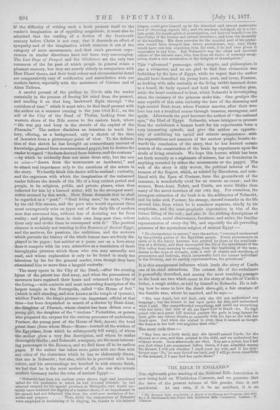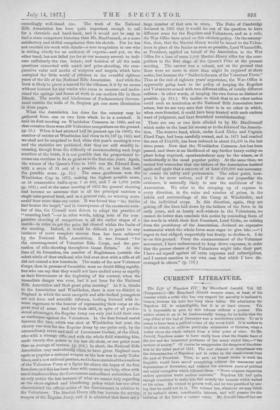THE RIFLE IN ENGLAND.* Toe eighteenth prize meeting of the
National Rifle Association is now being held on Wimbledon Common, and we presume that the issue of the present volume at this precise time is not accidental. At any rate, if it be an accident, it is an
7'he National Byte Association: a Sketch of its Ilistorp and Progress, 1859-1877. By J. B. MaeDonnoll, late Major lath Middlesex Me Volunteers. London : W. Johnson.
exceedingly well-timed one. The work of the National Rifle Association has been quite important enough to call for a chronicle and hand-book, and it would not be easy to find a more competent historian than Mr. MacDonnell, or a more satisfactory and skilful compilation than his sketch. For he has not overlaid his work with details—a sore temptation to one who is writing chiefly for an audience of experts—and yet, on the other hand, has not failed (so far as our memory serves) to indi- cate sufficiently the rise, debate, and decision of all the main -questions connected with match and prize-shooting, the com- parative value and merits of weapons and targets, which have occupied the little world of riflemen in the eventful eighteen years of the life of the National Rifle Association. And while the book is likely to prove a manual for the rifleman, it is by no means without interest for any reader who cares to measure and under- stand the springs and forces at work in our modern life in these Islands. The merits and hindrances of Parliamentary Govern- ment outside the walls of St. Stephen get one more illustration in these pages.
What the Association has done for the country may be gathered from one or two facts which lie in a nutshell. It held its first meeting on Wimbledon Common in 1860, and on that occasion there were.299 Volunteer competitors on the ground. (p. 15.) When it had attained half its present age (in 1869), the number of entries at Wimbledon had risen to 84,167 (p. 145), and we shall not be surprised to find, when this year's meeting is over and the statistics are published, that they are still steadily in- creasing, though from the difficulty of accommodating such huge numbers at the butts, it is not possible that the proportional in- crease can continue to be as great as in the first nine years. Again, the winner of the Queen's Prize in 1860 was Mr. Edward Ross, with a score of 24 out of a possible 60, or less than half the possible score. (p. 16.) The same gentleman won the Wimbledon Cup in 1872, making the highest possible score, or 14 consecutive bull's-eyes, 7 at 600, and 7 at 1,000 yards (p. 164) ; and at the same meeting of 1872 the general shooting had become so accurate that in all the principal matches a single miss proved fatal, and as a general rule, no winning score could bear more than one outer. It was found that "the Snider had beaten the target," and in consequence of the enormous num- ber of ties, the Council were driven to adopt the practice of "counting back "—or in other words, taking note of the com- parative shooting of competitors in all the earlier stages of a match—in order to get the prize list cleared, within the limits of the meeting. Indeed, it would be difficult to point to any instance of more complete success than has been achieved by the National Rifle 'Association, It was formed "for the encouragement of Volunteer Rifle Corps, and the pro- motion of rifle-shooting throughout Great Britain." At the time of its formation, the number of Englishmen (outside the select circle of deer-stalkers) who had ever shot with a rifle at all (lid not exceed a few hundreds. The ranks of the new Volunteer Corps, then in process of formation, were no doubt filling rapidly, but who can say that they would not have melted away as rapidly as their forerunners at the beginning of the century, when the immediate danger was over, had it not been for the National Rifle Association and their great prize meeting? As it is, thanks to the Association and Wimbledon, there is now no district in England in which the most energetic and able-bodied youngsters are not keen and scientific riflemen, looking forward with in- tense eagerness to the honour of representing their corps at the great trial of arms. And for their skill, in spite of all profes- sional advantages, the Regular Army can only just hold their own as marksmen against the Volunteers. In the first formal match between the two, which was shot at 'Wimbledon last year, the victory was won for the Regular Army by one point only, by the extraordinary nerve and skill of Lieutenant Godsal, of the 52nd, who with a strange rifle, and with the whole field watching him, made twenty-five points in his last six shots, or one point mere than an average of centres. (p. 206.) In short, the National Rifle Association may undoubtedly claim to have given England once again as popular a national weapon as the bow was in early Tudor times, and a new national pastime, and to have sustained the nutnhers of the Volunteer Force at a figure far above the hopes of its first founders; and this has been done with scarcely any help, often with much hindrance from the Government and military authorities. Lot us only notice the last instance of what we cannot help regarding as the short-sighted and blundering policy which has too often characterised the official action of the Government in relation to the Volunteers. The Martini-Henry rifle has become the service weapon of the Regular Army, and it is admitted that there are a large number of that arm in store. The Duke of Cambridge declared in 1863 that it would be out of the question to have different arms for the Regulars and Volunteers, and as a rule, the War Office have acted on this obvious policy. On the assmnp- tion, then, that the Martini-Henry would be issued to the Volun- teers in place of the Snider as soon as possible, Lord Wharneliffe, as President, applied on behalf of the Association to the War Office for a loan of some 2,000 Martini-Henry rifles for the com- petitors in the first stage of the Queen's Prize at the present meeting. The answer was a refusal, not on the ground that there were no more in store than might be required at short notice, but because the "Snider is the arm of the Volunteer Force." Thus at the end of eighteen years' experience, the 'War-Office is apparently going back to the policy of keeping the Regulars and Volunteers armed with two different rifles, of totally different calibres ; in other words, of keeping the two forces as distinct as possible. (p. 214.) We incline to think that in no other nation could such an institution as the National Rifle Association have arisen, but we are very sure that there is in no other in which, when once founded, it could have been treated with such curious want of judgment, and have flourished notwithstanding.
There are one or two facts alluded to by Mr. MacDonnell which make us the least bit uneasy as to the future of the Associa- tion. The reserve fund, which, under Lord Elcho and Captain Flood Page, had been carefully nursed, and in 1873 had reached the sum of 214,000, has been reduced to about ,E,4,500 in the last three years. Now that the Wimbledon Common Act has been passed, and there is no likelihood of any further heavy outlay on plant being required, openhandedness may be the wisest, as it undoubtedly is the most popular policy. At the same time, we cannot but remember that the fathers of the Association insisted again and again that a reserve of at least £10,000 was necessary. to ensure its safety and permanence. The other point, how- ever, is far more serious, and if it does not jeopardise the existence, is assuredly likely to mar the usefulness of the Association. We refer to the creeping up of expense in every direction, in the value and number of prizes, in the habits and surroundings of the Camp at Wimbledon, and of the individual corps. In this direction, again, they are getting off the lines laid down by the fathers of the force in its early years, and as hearty well-wishers to the Volunteers, we cannot do better than conclude this notice by reminding them of the words in which their first President, Lord Bleho, on retiring from the presidency of the Association, declined an expensive testimonial which the whole force were eager to give him :-•-•" I regret to feel obliged, respectfully but firmly, to decline it. I do so on this ground. From the commencement of the Volunteer movement, I have endeavoured to keep down expenses, in order that the poorer classes of the Volunteers might take their part. I have set myself against all extra expenses and subscriptions, and I cannot sanction in my own case that which I have dis- couraged in others." (p. 116,)



































 Previous page
Previous page